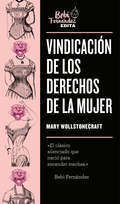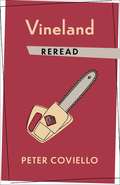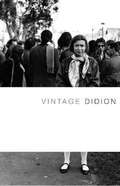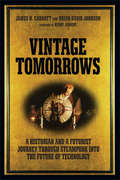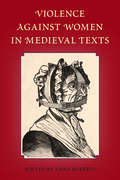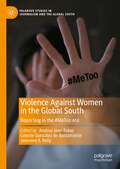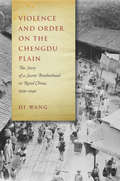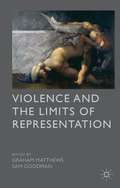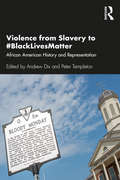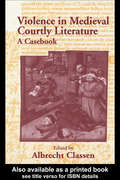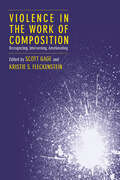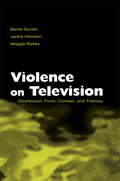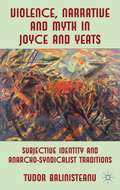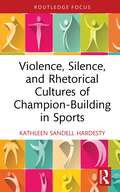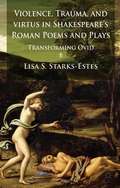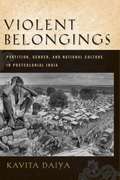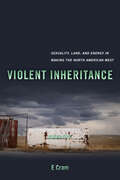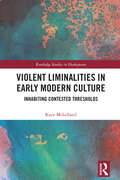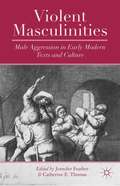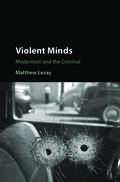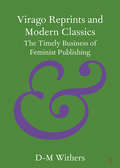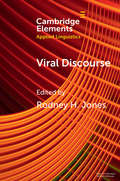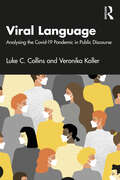- Table View
- List View
Vindicación de los derechos de la mujer
by Mary WollstonecraftLa colección «Bebi Edita» arranca con una de las primeras obras de la literatura y filosofía feministas. El primer manifiesto feminista revisado por una de las voces actuales más revolucionarias: Bebi. Desde su perspectiva única, @SrtaBebi comenta el texto madre del feminismo moderno, Vindicación de los derechos de la mujer, de Mary Wollstonecraft, una relectura con una granada en una mano y un subrayador en la otra. *** @SrtaBebi empezó incendiando las redes con más de 615.000 seguidores. Poco después inflamó libros: Indomable lleva más de 85.000 ejemplares vendidos. Ahora llega para editar su propia colección: «Bebi Edita». Ella decide autores, textos y añade su personal y único punto de vista en un prólogo y comentarios que acompañan a cada libro de la colección. Para seguir quemando.
Vineland Reread (Rereadings)
by Peter CovielloVineland is hardly anyone’s favorite Thomas Pynchon novel. Marking Pynchon’s return after vanishing for nearly two decades following his epic Gravity’s Rainbow, it was initially regarded as slight, a middling curiosity. However, for Peter Coviello, the oft-overlooked Vineland opens up new ways of thinking about Pynchon’s writing and about how we read and how we live in the rough currents of history.Beginning with his early besotted encounters with Vineland, Coviello reads Pynchon’s offbeat novel of sixties insurgents stranded in the Reaganite summer of 1984 as a delirious stoner comedy that is simultaneously a work of heartsick fury and political grief: a portrait of the hard afterlives of failed revolution in a period of stifling reaction. Offering a roving meditation on the uses of criticism and the practice of friendship, the fashioning of publics and counterpublics, the sentence and the police, Coviello argues that Vineland is among the most abundant and far-sighted of late-century American excursions into novelistic possibility. Departing from visions of Pynchon as the arch-postmodernist, erudite and obscure, he discloses an author far more companionable and humane. In Pynchon’s harmonizing of joyousness and outrage, comedy and sorrow, Coviello finds a model for thinking through our catastrophic present.
Vinnie the Dove: Targeting the v Sound (Speech Bubbles 2)
by Melissa PalmerVinnie loves to dive in water, but it always makes him so cold! Join him on his mission to find a way to finally get warmed up. This picture book targets the /v/ sound and is part of Speech Bubbles 2, a series of picture books that target specific speech sounds within the story. The series can be used for children receiving speech therapy, for children who have a speech sound delay/disorder, or simply as an activity for children’s speech sound development and/or phonological awareness. They are ideal for use by parents, teachers or caregivers. Bright pictures and a fun story create an engaging activity perfect for sound awareness. Picture books are sold individually, or in a pack. There are currently two packs available – Speech Bubbles 1 and Speech Bubbles 2. Please see further titles in the series for stories targeting other speech sounds.
Vintage Didion
by Joan Didion"Didion has the instincts of an exceptional reporter and the focus of a historian ... a novelist's appreciation of the surreal." --Los Angeles Times Book Review. Whether she's writing about civil war in Central America, political scurrility in Washington, or the tight-braided myths and realities of her native California, Joan Didion expresses an unblinking vision of the truth. Vintage Didion includes three chapters from Miami; an excerpt from Salvador; and three separate essays from After Henry that cover topics from Ronald Reagan to the Central Park jogger case. Also included is "Clinton Agonistes" from Political Fictions,and "Fixed Opinions, or the Hinge of History," a scathing analysis of the ongoing war on terror.
Vintage Tomorrows: A Historian And A Futurist Journey Through Steampunk Into The Future of Technology
by James H. Carrott Brian David JohnsonWhat would today's technology look like with Victorian-era design and materials? That's the world steampunk envisions: a mad-inventor collection of 21st century-inspired contraptions powered by steam and driven by gears. In this book, futurist Brian David Johnson and cultural historian James Carrott explore steampunk, a cultural movement that's captivated thousands of artists, designers, makers, hackers, and writers throughout the world.Just like today, the late 19th century was an age of rapid technological change, and writers such as Jules Verne and H.G. Wells commented on their time with fantastic stories that jumpstarted science fiction. Through interviews with experts such as William Gibson, Cory Doctorow, Bruce Sterling, James Gleick, and Margaret Atwood, this book looks into steampunk's vision of old-world craftsmen making beautiful hand-tooled gadgets, and what it says about our age of disposable technology.Steampunk is everywhere--as gadget prototypes at Maker Faire, novels, and comic books, paintings and photography, sculptures, fashion design, and music. Discover how this elaborate view of a history that never existed can help us reimagine our future.
Violence Against Women in Medieval Texts
by Anna RobertsThis volume brings together specialists from different areas of medieval literary study to focus on the role of habits of thought in shaping attitudes toward women during the Middle Ages. The essays range from Old English literature to the Spanish Inquisition and encompass such genres as romance, chronicles, hagiography, and legal documents.
Violence Against Women in the Global South: Reporting in the #MeToo era (Palgrave Studies in Journalism and the Global South)
by Andrea Jean Baker Celeste González de Bustamante Jeannine E. RellyBringing together 14 journalism scholars from around the world, this edited collection addresses the deficit of coverage of violence against women in the Global South by examining the role of the legacy press and social media that report on and highlight ways to improve reporting. Authors investigate the ontological limitations which present structural and systemic challenges for journalists who report on the normalization of violence against women in country cases in Argentina; Brazil; Mexico; Indonesia; Kenya, Nigeria, South Africa; Egypt; Libya, Syria, and Yemen. Challenges include patriarchal forces; gender imbalance in newsrooms; propaganda and censorship strategies by repressive, hyper-masculine, and populist political regimes; economic and digital inequities; and civil and transnational wars. Presenting diverse conceptual, methodological, and empirical chapters, the collection offers a revision of existing frameworks and guidelines and aims to promote more gender-sensitive, trauma-informed, solutions-driven, and victim or survivor centered reporting in the region.
Violence and Order on the Chengdu Plain: The Story of a Secret Brotherhood in Rural China, 1939-1949
by Di WangIn 1939, residents of a rural village near Chengdu watched as Lei Mingyuan, a member of a violent secret society known as the Gowned Brothers, executed his teenage daughter. Six years later, Shen Baoyuan, a sociology student at Yenching University, arrived in the town to conduct fieldwork on the society that once held sway over local matters. She got to know Lei Mingyuan and his family, recording many rare insights about the murder and the Gowned Brothers' inner workings. Using the filicide as a starting point to examine the history, culture, and organization of the Gowned Brothers, Di Wang offers nuanced insights into the structures of local power in 1940s rural Sichuan. Moreover, he examines the influence of Western sociology and anthropology on the way intellectuals in the Republic of China perceived rural communities. By studying the complex relationship between the Gowned Brothers and the Chinese Communist Party, he offers a unique perspective on China's transition to socialism. In so doing, Wang persuasively connects a family in a rural community, with little overt influence on national destiny, to the movements and ideologies that helped shape contemporary China.
Violence and the Limits of Representation
by Graham MatthewsViolence and the Limits of Representation explores the representation of violence in literature, film, drama, music and art in order to demonstrate the ways in which the work done by researchers in the Arts and Humanities can offer fresh perspectives on current social and political issues.
Violence from Slavery to #BlackLivesMatter: African American History and Representation
by Andrew Dix Peter TempletonViolence from Slavery to #BlackLivesMatter brings together perspectives on violence and its representation in African American history from slavery to the present moment. Contributors explore how violence, signifying both an instrument of the white majority’s power and a modality of black resistance, has been understood and articulated in primary materials that range from slave narrative through "lynching plays" and Richard Wright’s fiction to contemporary activist poetry, and from photography of African American suffering through Blaxploitation cinema and Spike Lee’s films to rap lyrics and performances. Diverse both in their period coverage and their choice of medium for discussion, the 11 essays are unified by a shared concern to unpack violence’s multiple meanings for black America. Underlying the collection, too, is not only the desire to memorialize past moments of black American suffering and resistance, but, in politically timely fashion, to explore their connections to our current conjuncture.
Violence in Medieval Courtly Literature: A Casebook (Garland Medieval Casebooks)
by Albrecht ClassenAlthough courtly literature is often associated with a chivalrous and idyllic life, the fifteen original essays in this collection demonstrate that the quest for love in the world of medieval courtly literature was underpinned by violence. Lovers were rejected, mistrust ruled, rape was a rampant problem, and marriage was often characterized by brutality. Albrecht Classen brings together an outstanding group of historical, cultural, and literary scholars in this volume to investigate the complicated, nuanced, and often surprising unions of love and violence in courtly medieval literature.
Violence in the Black Imagination: Essays and Documents
by Ronald T. TakakiIn "Violence in the Black Imagination", Ronald T. Takaki presents three short novels by major African-American leaders in the nineteenth century: "The Heroic Slave", by Frederick Douglass, the leading black abolitionist; "Blake", by Martin Delany, the father of black nationalism; and "Clotelle", by William Wells Brown, a pioneer of the black novel. The novels are accompanied by substantive essays which provide biographical information on the authors and explore the common theme of their works -- the issue of black revolutionary violence in antebellum America.
Violence in the Work of Composition: Recognizing, Intervening, Ameliorating
by Kristie S. Fleckenstein Scott GageFocusing on overt and covert violence and bringing attention to the many ways violence inflects and infects the teaching, administration, and scholarship of composition, Violence in the Work of Composition examines both forms of violence and the reciprocal relationships uniting them across the discipline. Addressing a range of spaces, the collection features chapters on classroom practices, writing centers, and writing program administration, examining the complicated ways writing instruction is interwoven with violence, as well as the equally complicated ways writing teachers may recognize and resist the presence and influence of violence in their work. This book provides a focused, nuanced, and systematic discussion of violence and its presence and influence across pedagogical and administrative sites. Violence in the Work of Composition offers a close look at the nature of violence as it emerges in the work of composition; provides strategies for identifying violence, especially covert violence, addressing its impact and preventing its eruption across many sites; and invites readers to reflect on both the presence of violence and the hope for its cessation. Contributors consider, first, how compositionists can recognize the ways their work inadvertently enacts and/or perpetuates violence and, second, how they can intervene and mitigate that violence. Rich with the voices of myriad stakeholders, Violence in the Work of Composition initiates an essential conversation about violence and literacy education at a time when violence in its many forms continues to shape our culture, communities, and educational systems. Contributors: Kerry Banazek, Katherine Bridgman, Eric Camarillo, Elizabeth Chilbert Powers, Joshua Daniel, Lisa Dooley, Allison Hargreaves, Jamila Kareem, Lynn C. Lewis, Trevor Meyer, Cathryn Molloy, Kellie Sharp-Hoskins, Ellen Skirvin, Krista Speicher Sarraf, Thomas Sura, James Zimmerman
Violence on Television: Distribution, Form, Context, and Themes (Routledge Communication Series)
by Barrie Gunter Maggie Wykes Jackie HarrisonConcern about violence on television has been publicly debated for the past 50 years. TV violence has repeatedly been identified as a significant causal agent in relation to the prevalence of crime and violence in society. Critics have accused the medium of presenting excessive quantities of violence, to the point where it is virtually impossible for viewers to avoid it. This book presents the findings of the largest British study of violence on TV ever undertaken, funded by the broadcasting industry. The study was carried out at the same time as similar industry-sponsored research was being conducted in the United States, and one chapter compares findings from Britain and the U.S.A. The book concludes that it is misleading to accuse all broadcasters of presenting excessive quantities of violence in their schedules. This does not deny that problematic portrayals were found. But the most gory, horrific and graphic scenes of violence were generally contained within broadcasts available on a subscription basis or in programs shown at times when few children were expected to be watching. This factual analysis proves that broadcasters were meeting their obligations under their national regulatory codes of practice.
Violence, Narrative and Myth in Joyce and Yeats
by Tudor BalinisteanuHow can we use art to reconstruct ourselves and the material world? Is every individual an art object? Is the material world an art text? This book answers these questions by examining modernist literature, especially James Joyce and W. B. Yeats, in the context of anarchist intellectual thought and Georges Sorel's theory of social myth.
Violence, Silence, and Rhetorical Cultures of Champion-Building in Sports (Routledge Studies in Rhetoric and Communication)
by Kathleen Sandell HardestyThis book takes a close look at systems and rhetorics of silencing in sports training. Using the case study of the Larry Nassar abuse scandal at Michigan State University and within USA Gymnastics, the book explores multifaceted problems of speaking, silencing, and listening in youth and college athletic organizations, investigating the cultures of abuse and discursive practices that silence victims while protecting abusers. The author foregrounds the victims’ voices through an analysis of victim impact statements and victim interviews, while examining other textual artifacts to understand the institutional behaviors and actions both before and after the case caught public attention. Exploring the issue far beyond the single organization, the author discusses the norms, values, ideologies, and expected behaviors of youth and college sports programs as institutions to help describe “rhetorical cultures of champion-building.” This innovative study offers new perspectives that will interest students and scholars of sport communication, rhetoric, organizational communication, criminology, and feminist theory.
Violence, Trauma, and Virtus in Shakespeare’s Roman Poems and Plays
by Lisa S. Starks-EstesEmploying psychoanalysis, trauma theory, and materialist perspectives, this book examines Shakespeare's appropriations of Ovid's poetry in his Roman poems and plays. It argues that Shakespeare uses Ovid to explore violence, trauma, and virtus - the traumatic effects of aggression, sadomasochism, and the shifting notions of selfhood and masculinity.
Violent Belongings: Partition, Gender, and National Culture in Postcolonial India
by Kavita DaiyaFocusing on the historical and contemporary narration of the Partition of India,Violent Belongingsexamines transnational South Asian culture from 1947 onwards. Spanning the Indian subcontinent and its diasporas in the United Kingdom and the United States, it asks how postcolonial/diasporic literature (eg. , Rushdie, Mistry, Sidwa and Lahiri), Bollywood film, personal testimonies and journalism represent the violence, migration and questions of national belonging unleashed by that pivotal event during which two million people died and sixteen million were displaced. In addition to challenging the official narratives of independence and Partition, these narratives challenge our contemporary understanding of gender and ethnicity in history and politics. Violent Belongingsargues that both male and female bodies, and heterosexual coupledom, became symbols of the nation in public life. In the newly independent Indian nation both men and women were transformed into ideal citizens or troubling bodies, immigrants or refugees, depending on whether they were ethnically Hindu, Muslim, Jewish or Sikh. The divisions set in motion during Partition continue into our own time and account for ethnic violence in South Asia.
Violent Inheritance: Sexuality, Land, and Energy in Making the North American West (Environmental Communication, Power, and Culture #3)
by E CramViolent Inheritance deepens the analysis of settler colonialism's endurance in the North American West and how infrastructures that ground sexual modernity are both reproduced and challenged by publics who have inherited them. E Cram redefines sexual modernity through extractivism, wherein sexuality functions to extract value from life including land, air, minerals, and bodies. Analyzing struggles over memory cultures through the region's land use controversies at the turn of and well into the twentieth century, Cram unpacks the consequences of western settlement and the energy regimes that fueled it. Transfusing queer eco-criticism with archival and ethnographic research, Cram reconstructs the linkages—"land lines"—between infrastructure, violence, sexuality, and energy and shows how racialized sexual knowledges cultivated settler colonial cultures of both innervation and enervation. From the residential school system to elite health seekers desiring the "electric" climates of the Rocky Mountains to the wartime incarceration of Japanese Americans, Cram demonstrates how the environment promised to some individuals access to vital energy and to others the exhaustion of populations through state violence and racial capitalism. Grappling with these land lines, Cram insists, helps interrogate regimes of value and build otherwise unrealized connections between queer studies and the environmental and energy humanities.
Violent Liminalities in Early Modern Culture: Inhabiting Contested Thresholds (Routledge Studies in Shakespeare)
by Kaye McLellandViolent liminalities in Early Modern Culture is a methodologically innovative book combining the twin disciplines of queer theory and disability studies. It investigates the violence feared from, and directed at, inhabitants of the ‘betwixt and between’ spaces of early modern literature and culture, through a focus on the perpetuated metamorphic states of Shakespeare’s and Spenser’s liminal figures including Lavinia, Puck, and Britomart. With chapters on gender, sexuality, adolescence, madness, and physical disability, Kaye McLelland applies a bi-theoretical lens to interrogate the ways in which being simultaneously ‘neither’ and ‘both’ brings to bear the non-normative disruption identified by queer theory in ways that use binary systems against themselves. For many of Spenser’s and Shakespeare’s characters, the ‘in-between’ state, whether ritually or otherwise induced, transforms the instantaneous binary threshold of the limen into a permanent ‘habitation’. This created space is one of great power that is feared and violently countered by those who would shut it down. Set against the literary history of Spenser’s and Shakespeare’s Ovidianism and festivity, and the historical context of the post-Reformation transformation from a tertiary to a binary model of the afterlife, this volume identifies a persistent positioning of liminal literary figures in proximity to the liminality of the dead and dying, whilst simultaneously tracing the positive ways in which these inhabitants of the powerful ‘betwixt and between’ are depicted.
Violent Masculinities
by Jennifer Feather Catherine E. ThomasDuring the early modern period in England, social expectations for men came under extreme pressure - the armed knight went into decline and humanism appeared. Here, original essays analyze a wide-range of violent acts in literature and culture, from civic violence to chivalric combat to brawls and battles.
Violent Minds: Modernism and the Criminal
by Matthew LevayJust as cultural attitudes toward criminality were undergoing profound shifts in the late nineteenth and early twentieth centuries, modernist authors became fascinated by crime and its perpetrators, as well as the burgeoning genre of crime fiction. Throughout the period, a diverse range of British and American novelists took the criminal as a case study for experimenting with forms of psychological representation while also drawing on the conventions of crime fiction in order to imagine new ways of conceptualizing the criminal mind. Matthew Levay traces the history of that attention to criminal psychology in modernist fiction, placing understudied authors like Wyndham Lewis, Dorothy Sayers, Graham Greene, and Patricia Highsmith in dialogue with more canonical contemporaries like Joseph Conrad, Henry James, Dashiell Hammett, and Gertrude Stein. Levay demonstrates criminality's pivotal role in establishing quintessentially modernist forms of psychological representation and brings to light modernism's deep but understudied connections to popular literature, especially crime fiction.
Virago Reprints and Modern Classics: The Timely Business of Feminist Publishing (Elements in Publishing and Book Culture)
by D-M WithersReprinting, republishing and re-covering old books in new clothes is an established publishing practice. How are books that have fallen out of taste and favour resituated by publishers, and recognised by readers, as relevant and timely? This Element outlines three historical textures within British culture of the late 1970s and early 1980s – History, Remembrance and Heritage – that enabled Virago's reprint publishing to become a commercial and cultural success. With detailed archival case studies of the Virago Reprint Library, Testament of Youth and the Virago Modern Classics, it elaborates how reprints were profitable for the publisher and moved Virago's books - and the Virago brand name - from the periphery of culture to the centre. Throughout Virago's reprint publishing - and especially with the Modern Classics - the epistemic revelation that women writers were forgotten and could, therefore, be rediscovered, was repeated, again and again, and made culturally productive through the marketplace.
Viral Discourse (Elements in Applied Linguistics)
by Rodney H. JonesThis Element consists of ten short pieces written by prominent discourse analysts in the midst of the COVID-19 pandemic. Each piece focuses on a different aspect of the pandemic, from the debate over wearing face masks to the metaphors used by politicians and journalists in different countries to talk about the virus. Each of the pieces also makes use of a different approach to analysing discourse (e.g. Critical Discourse Analysis, Genre Analysis, Corpus Assisted Discourse Analysis) and demonstrates how that approach can be applied to a small set of data. The aim of the Element is to show how the range of tools available to discourse analysts can be brought to bear on a pressing, 'real-world' problem, and how discourse analysis can contribute to formulating 'real-world' solutions to the problem.
Viral Language: Analysing the Covid-19 Pandemic in Public Discourse
by Veronika Koller Luke C. CollinsViral Language considers a range of different types of public communication and their discussion of the Covid-19 pandemic as a way to investigate health communication. The authors introduce and apply a range of approaches informed by linguistic theory to investigate experiences of the pandemic across a variety of public contexts. In doing so, they demonstrate how experiences of health and illness can be shaped by political messaging, scientific research, news articles and advertising. Through a series of case studies of Covid-related texts, the authors consider aspects of language instruction, information and innovation, showcasing the breadth of topics that can be studied as part of health communication. Furthermore, each case study provides practical guidance on how to carry out investigations using social media texts, how to analyse metaphor, how to track language innovation and how to work with text and images. Viral Language is critical reading for postgraduate and upper undergraduate students of applied linguistics and health communication.
